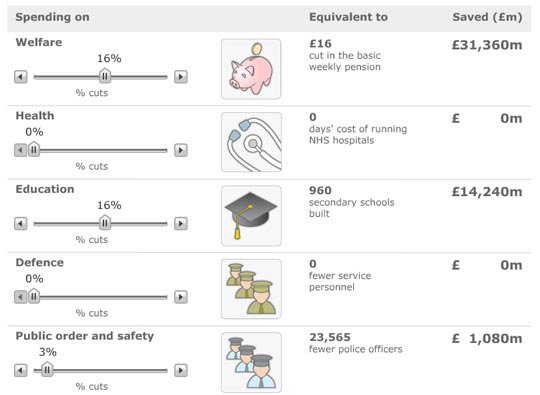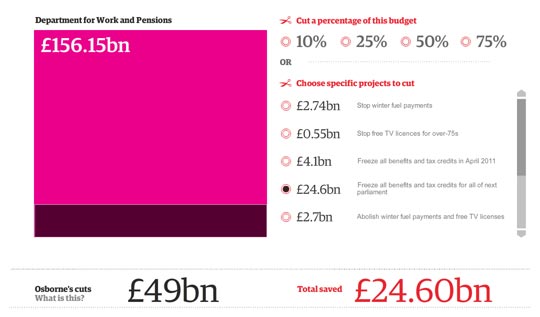First of all, a gauntlet, laid down by Steve Schifferes, Professor of Financial Journalism at City University London. Says Schifferes:
News coverage of the spending review and Budget has been too focused on presenting the government’s viewpoint that large and rapid reductions in public spending are both inevitable and desirable.
This example of group think has been exacerbated by the lack of an effective opposition, with Labour hobbled by its long-drawn out leadership campaign. The coverage of this spending review will be a test for the media as well as the government, in showing whether they can cut through the rhetoric and the confusing welter of figures to come up with the real story of the cuts and their effects on ordinary people.
So how are the big online news sites in the UK handling the cuts’ coverage?
Going live
BBC News Online editor Steve Herrmann says the site’s main focus will be on live coverage with two video streams: a special Andrew Neill programme and BBC Parliament.
We’ll be aiming to reflect the latest of these live entries on other parts of the site too, including the front page, to give a sense of how the detail of the story is unfolding – a technique we developed and first used for our live election coverage earlier this year. Beyond that we’ll be summarising the key elements of the story with graphics to show the extent of the cuts to various areas, and integrating our correspondents’ expert analysis throughout, all brought together on a Special Report page at www.bbc.co.uk/spendingreview
Channel 4 News will be streaming the statement from Chancellor George Osborne live on its website and offering immediate reactions from its experts via their on-site blogs. But the site is also planning a series of infographics that will be used during the speech to better explain what the cuts mean for the public.
Skynews.com will also carry a livestream of Osborne’s speech. Shortly after there will be an interactive guide to the cuts, showing how much each department’s spending will be cut over the next four years and highlighting key spending changes by government department.
The Telegraph has a comprehensive liveblog of minute-by-minute news relating to the cuts. What’s great about this liveblog is it’s also linking out to other news coverage, as well as Telegraph.co.uk coverage elsewhere, including a DIY guide for UK households wanting to introduce their own money-saving measures.
Interactive games and putting the public in the picture
The BBC has a simple but effective video wall of short clips from members of the public explaining what they would save and cut.
Top of the graphics is the Guardian’s colourful chart of UK public spending since 1948, where you can see today’s spending as a percentage of GDP.
The BBC, Guardian and Channel 4 have all produced some interactive games allowing you to pick and choose what you would cut and see the impact that this would have on overall savings:
BBC

The Guardian

Channel 4 News

How are you covering the cuts? Let us know in the comments below.


